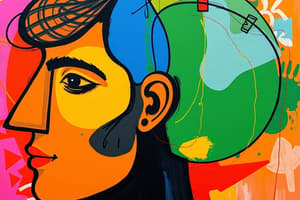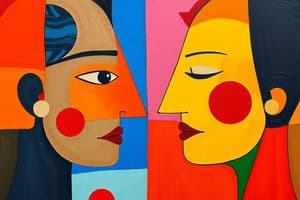Podcast
Questions and Answers
What is meant by the phrase 'the unexamined life is no better off than animal life'?
What is meant by the phrase 'the unexamined life is no better off than animal life'?
- Only animals have basic desires and needs.
- Self-reflection distinguishes humans from animals. (correct)
- Animals live a more fulfilling life than examined lives.
- Living without self-reflection is essential for happiness.
According to the philosophical perspective, what constitutes a person's true self?
According to the philosophical perspective, what constitutes a person's true self?
- Their social status
- Their possessions
- Their soul (correct)
- Their body
Which aspect of the soul is associated with basic desires and needs?
Which aspect of the soul is associated with basic desires and needs?
- Emotional Soul
- Spirited Soul
- Appetitive Soul (correct)
- Rational Soul
What role does philosophy play in understanding the self?
What role does philosophy play in understanding the self?
What does Socrates consider to be the ultimate virtue?
What does Socrates consider to be the ultimate virtue?
Which of the following best describes the Spirited Soul?
Which of the following best describes the Spirited Soul?
Which philosopher founded the Academy and was a student of Socrates?
Which philosopher founded the Academy and was a student of Socrates?
What distinguishes the Rational Soul from the other types of souls?
What distinguishes the Rational Soul from the other types of souls?
Which philosopher proposed the Bundle Theory of Self?
Which philosopher proposed the Bundle Theory of Self?
According to the content, what happens to the soul when the body dies?
According to the content, what happens to the soul when the body dies?
What does maladaptive culture imply about community practices?
What does maladaptive culture imply about community practices?
Which statement about personal identity is false?
Which statement about personal identity is false?
What is the primary source of true and eternal happiness according to Saint Augustine?
What is the primary source of true and eternal happiness according to Saint Augustine?
What aspect of the self does Immanuel Kant emphasize as crucial?
What aspect of the self does Immanuel Kant emphasize as crucial?
What are the three parts of the soul/self as described?
What are the three parts of the soul/self as described?
Which statement best represents the relationship between the body and soul?
Which statement best represents the relationship between the body and soul?
What is the process of enculturation primarily concerned with?
What is the process of enculturation primarily concerned with?
Which region primarily reflects a person's adaptive behaviors during social interactions?
Which region primarily reflects a person's adaptive behaviors during social interactions?
What is inherent in the rational part of the soul according to the content?
What is inherent in the rational part of the soul according to the content?
Which of the following is NOT considered an agent of socialization?
Which of the following is NOT considered an agent of socialization?
What is the primary role of impression management in social interactions?
What is the primary role of impression management in social interactions?
What is the Ideal Self primarily concerned with?
What is the Ideal Self primarily concerned with?
Which component of self refers to our material possessions?
Which component of self refers to our material possessions?
Who proposed the concept that the Ideal Self should be congruent with the Real Self for optimal development?
Who proposed the concept that the Ideal Self should be congruent with the Real Self for optimal development?
What happens if the Ideal Self is significantly distant from the Real Self?
What happens if the Ideal Self is significantly distant from the Real Self?
Which statement best describes the concept of Human Agency?
Which statement best describes the concept of Human Agency?
What does Global Self-esteem signify?
What does Global Self-esteem signify?
What does State Self-esteem refer to?
What does State Self-esteem refer to?
What is the core difference between True Self and False Self according to Winnicott?
What is the core difference between True Self and False Self according to Winnicott?
What is the primary focus of Domain Specific Self-Esteem?
What is the primary focus of Domain Specific Self-Esteem?
In the context of self-concept, what do Multiple Selves represent?
In the context of self-concept, what do Multiple Selves represent?
What represents the closer a person's Ideal Self is to their Real Self?
What represents the closer a person's Ideal Self is to their Real Self?
What does the Actual Self represent in a person's life?
What does the Actual Self represent in a person's life?
What aspect does the Western perspective on self primarily emphasize?
What aspect does the Western perspective on self primarily emphasize?
How does Self Efficacy affect an individual’s approach to challenges?
How does Self Efficacy affect an individual’s approach to challenges?
What does the term 'Unified Selves' imply about an individual's personality?
What does the term 'Unified Selves' imply about an individual's personality?
In contrast to the Western view, what does the Eastern perspective emphasize regarding the self?
In contrast to the Western view, what does the Eastern perspective emphasize regarding the self?
Flashcards are hidden until you start studying
Study Notes
Philosophical Perspectives on The Self
- The Self is more than just measurable facts.
- Understanding the Self is important to know your limits, practice self-moderation, and cultivate excellence.
- Ancient Greeks believed the soul is the essence of a person.
- Socrates believed self-knowledge is the ultimate virtue and that an unexamined life is not worth living.
- Plato defined three kinds of soul: appetitive, spirited, and rational.
- Aristotle believed the body and soul are one, and the soul dies with the body.
- Saint Augustine believed true and eternal happiness is only achieved through God.
- Rene Descartes famously stated "I think therefore I am."
Personal Identity
- Essential Properties of the self remain constant despite changes.
- Philosophy studies the self through logic and reasoning.
- John Locke believed that personal identity is based on consciousness and memory.
- David Hume proposed the Bundle Theory of Self, suggesting that the self is a collection of perceptions.
- Immanuel Kant argued the self is not just personality but also the seat of knowledge.
- Sigmund Freud proposed the Id, Ego, and Superego as the components of the self.
Cultural Identity
- Culture originates from the word "cultura," meaning care or cultivation.
- It is analogous to caring for an infant, guiding patterns and systems of life.
- Adaptive Culture maintains core values.
- **Maladaptive Culture ** may hinder the community's identity and progress.
Enculturation
- Enculturation is transmitting cultural values from one generation to the next.
The Self
- Me is the self as known.
- I is conscious of the "Me."
Components of the Self:
- Material Self: Possessions and belongings.
- Social Self: How we present ourselves in social situations.
- Spiritual Self: The core of our identity.
Ideal Self vs. Real Self
- Ideal Self: The person we aspire to be, including our goals and ambitions.
- Real Self: Our actual self, encompassing our thoughts, actions, and behaviors.
- Congruence between the Ideal Self and Real Self leads to fulfillment and happiness.
Karen Horney's Self Theory
- Idealized Self Image: An imaginary picture of perfection.
- Actual Self: The person in everyday life.
- Real Self: The authentic self, revealed by shedding defense mechanisms.
Multiple vs. Unified Selves
- Multiple Selves: Capacities gained from multiple relationships.
- Unified Selves: Well-being achieved through congruence in personality dynamics.
True vs. False Selves
- True Self: A sense of authentic being.
- False Self: A defensive mechanism, conforming to external demands.
The Self as Proactive and Agentic
- Human agency: Active exploration and manipulation of the environment to achieve goals.
Albert Bandura's Self-Efficacy
- Self-Efficacy: One's belief in their ability to complete goals.
- High Self-Efficacy: Willingness to take on challenges.
- Low Self-Efficacy: Avoidance of challenges.
Western and Eastern Perspectives of the Self
- Western perspectives: Focus on the duality of body and soul.
- Eastern perspectives: Emphasis on transformation of inner consciousness and interconnectedness.
- Confucianism: Stresses the relational self and social understanding.
Studying That Suits You
Use AI to generate personalized quizzes and flashcards to suit your learning preferences.




